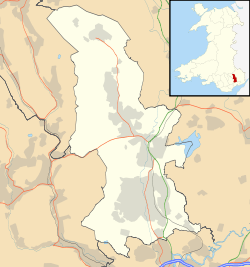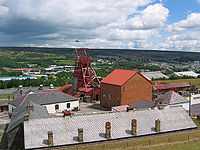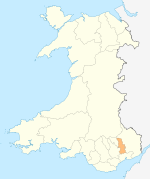Blaenavon
| Blaenavon | |
| Welsh: Blaenafon | |
| Blaenavon |
|
 Blaenavon |
|
| Area | 17.83 km2 (6.88 sq mi) [1] |
|---|---|
| Population | 6,055 [2] |
| – density | 340/km2 (880/sq mi) |
| GSS code | W04000760 |
| OS grid reference | SO 255 095 |
| Community | Blaenavon |
| Principal area | Torfaen |
| Ceremonial county | Gwent |
| Country | Wales |
| Sovereign state | United Kingdom |
| Post town | PONTYPOOL |
| Postcode district | NP4 |
| Dialling code | 01495 |
| Police | Gwent |
| Fire | South Wales |
| Ambulance | Welsh |
| EU Parliament | Wales |
| UK Parliament | Torfaen |
| Welsh Assembly | Torfaen |
Coordinates: 51°46′25″N 3°04′58″W / 51.77363°N 3.08278°W
| Blaenavon Industrial Landscape | |
|---|---|
| Name as inscribed on the World Heritage List | |
| Type | Cultural |
| Criteria | iii, iv |
| Reference | 984 |
| UNESCO region | Europe and North America |
| Inscription history | |
| Inscription | 2000 (24th Session) |
Blaenavon (Welsh: Blaenafon) is a town and World Heritage Site in south eastern Wales, lying at the source of the Afon Lwyd north of Pontypool, within the boundaries of the historic county of Monmouthshire and the preserved county of Gwent. The town lies high on a hillside and has a population of 6,055. Blaenavon literally means "front of the river" or loosely "river's source" in the Welsh language.
Blaenavon is a community and electoral ward of Torfaen County Borough Council. It is also represented by Blaenavon Town Council.
History
Blaenavon grew around an ironworks[3] opened in 1788, part of which is now a museum. The steel-making and coal mining industries followed, boosting the town's population to over 20,000 at one time,[4] but since the ironworks closed in 1900 and the coal mine in 1980, the population has declined.
Attractions in the town include the Big Pit National Coal Museum (an Anchor Point of ERIH, The European Route of Industrial Heritage), Blaenavon Ironworks,[5] the Pontypool and Blaenavon Railway, Blaenavon World Heritage Centre, Blaenavon Male Voice Choir and many historical walks through Blaenavon's mountains.
The Pontypool and Blaenavon Railway is a local tourist attraction. Blaenavon lost both of its passenger railway stations many years ago with Blaenavon High Level station closing as early as 1941 and the last train from Blaenavon (Low Level) to Newport via Pontypool Crane Street leaving in April 1962. Contrary to what is often remembered locally, the lower line had already been closed for more than a year before the notorious Beeching Axe came into effect. It was later disclosed that a number of rail passenger services within Monmouthshire were withdrawn in the early 1960s, not because they were doing particularly badly in financial terms, but because of severe rail congestion in the Newport area due to the amount of traffic coming from the then newly opened Llanwern steelworks.
Blaenavon Golf Club (now defunct) was founded in 1906. The club closed in 1937.[6]
Attempts were made in 2003 to turn around the town's image by introducing it as Wales' second "book town" (the first being Hay-on-Wye). However the project did not succeed.[7] This can be attributed to a combination of the town's remote location and the established competition from Hay. There are many thriving community groups within the town, including Future Blaenavon, which has helped to create a community garden at the bottom of the town.
Blaenavon is twinned with Coutras in France.
Time Team dig
The Channel 4 archaeology television programme Time Team came to Blaenavon during its February 2001 series to find "The Lost Viaduct" - "the world's first railway viaduct". This had been built in 1790, to be used by horse-drawn wagons to carry coal from the mines. Despite being about 40 metres long and 10 metres high, within about 25 years of its construction it had completely disappeared. But with no records of its demolition, the group was there to see what might remain of this structure. Eventually, during the mid to late afternoon of the final (third) day of the excavation, the team managed to uncover the top of the viaduct, the arched roof of which, under 12–15 metres of rubble and earth, was seemingly still standing. However, because it was so late on their last day, and for reasons of safety, they were unable to dig any further.
Notable people
- See also Category:People from Blaenavon
Radio presenter/manager Gareth Sweeney (Bro Radio and Valleys Radio), notable Broadway and film actor E. E. Clive, and international rugby union players Mark Taylor (Wales), Ken Jones (Wales and British Lions and also Olympic athlete), John Perkins (Wales), and Terry Cobner (Wales and British Lions) were all born in Blaenavon.
Gallery of Blaenavon photos
-

Big Pit Mining Museum
-

Rail manufactured in Blaenavon, seen in Sweden
-

Horeb Baptist church
-

Blaenavon War Memorial and Workmen's Hall
See also
- Mining in Wales
- Torfaen
- Communities of Torfaen
- Grade I listed buildings in Torfaen
- Grade II* listed buildings in Torfaen
- Scheduled Monuments in Torfaen
References
- ↑ "2011 Census:Quick Statistics:Population Density for Blaenavon". Office for National Statistics. Retrieved 29 Nov 2013.
- ↑ "2011 Census:Key Statistics:Key Figures for Blaenavon". Office for National Statistics. Retrieved 25 Nov 2013.
- ↑ Ironworks photo at geograph
- ↑ Workmen's Hall photo at geograph
- ↑ Blaenavon Ironworks
- ↑ “Blaenavon Golf Club”, “Golf’s Missing Links”.
- ↑ the Book Guide: Blaenafon - The Booktown Experiment Fails, 17 March 2006. Accessed 2 November 2012
External links
| Wikimedia Commons has media related to Blaenavon. |
- Old photos of Blaenavon
- Welsh Coal Mines - all the pits, all the histories
- Blaenavon Town Council
- Time Team - The Lost Viaduct
- Aerial photograph of Blaenavon in 1999
- Blaenavon Local History Society website
 Chisholm, Hugh, ed. (1911). "Blaenavon". Encyclopædia Britannica 4 (11th ed.). Cambridge University Press.
Chisholm, Hugh, ed. (1911). "Blaenavon". Encyclopædia Britannica 4 (11th ed.). Cambridge University Press.
 |
Llanelly (Monmouthshire) | Llanfoist (Monmouthshire) | Llanfoist (Monmouthshire) |  |
| Nantyglo and Blaina (Caerphilly) | |
Llanover (Monmouthshire) | ||
| ||||
| | ||||
| Abertillery (Caerphilly) | Abersychan | Abersychan |
| |||||||||||||||||||||||||||||||||

